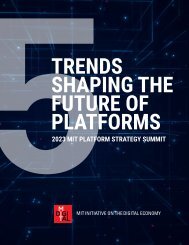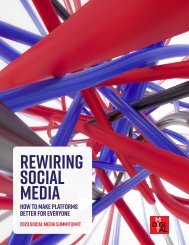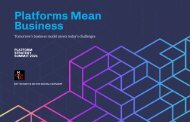Create successful ePaper yourself
Turn your PDF publications into a flip-book with our unique Google optimized e-Paper software.
PANEL<br />
WATCH VIDEO<br />
ENSURING TRANSPARENCY<br />
Online privacy and security remain at odds.<br />
Who decides what data to protect?<br />
PANELISTS<br />
READ BIOS<br />
Carole Cadwalladr<br />
AUTHOR AND JOURNALIST<br />
THE OBSERVER<br />
Nate Persily<br />
PROFESSOR<br />
STANFORD LAW SCHOOL<br />
<strong>The</strong> world is facing what Sinan Aral calls<br />
a “transparency paradox.” On one side<br />
is the necessity for researchers and the<br />
public to know what’s going on under the<br />
hood of platforms. <strong>The</strong>y want to know<br />
where data originates, how accurate it is,<br />
and what it’s used for.<br />
At the same time, there’s a critical need<br />
to safeguard individual data privacy and<br />
security. With unprecedented amounts of<br />
data about individuals and about society,<br />
how can we balance these two needs?<br />
HOLDING THEM ACCOUNTABLE<br />
<strong>The</strong> experts on the “Ensuring<br />
Transparency” panel agreed that<br />
Facebook, in particular, must be held<br />
accountable for not freely releasing<br />
data to researchers and users.<br />
John Markoff<br />
AFFILIATE FELLOW<br />
STANFORD HAI<br />
Kate Starbird<br />
ASSOCIATE PROFESSOR<br />
UNIVERSITY OF WASHINGTON<br />
“It’s been two decades and here we<br />
are—corporations can’t self-police.<br />
We need robust legislation.”<br />
JOHN MARKOFF<br />
Carole Cadwalladr, the London-based<br />
journalist who broke the story of<br />
Cambridge Analytica profiting from<br />
sharing Facebook data, believes that<br />
the social media giant is the only one<br />
protecting its privacy today. “Journalists<br />
and the public are out-gunned in our<br />
ability to get data and answers from<br />
Facebook,” said Cadwalladr.<br />
<strong>The</strong> Cambridge Analytica scandal<br />
initially sparked calls to reform Facebook<br />
and other platforms, yet the public<br />
soon lost interest. When the Federal<br />
Trade Commission fined Facebook $5<br />
billion for anticompetitive practices,<br />
the company’s share price actually<br />
rose. Cadwalladr argues that sustained<br />
pressure and penalties must be levied<br />
on social media companies to hold them<br />
accountable for their actions.<br />
BETTER DATA ACCESS<br />
Researchers and data scientists<br />
continue to express frustration over the<br />
lack of data access to major platforms.<br />
Kate Starbird, an associate professor<br />
at the University of Washington, notes<br />
that one company is making its data<br />
more available. “We are able to review<br />
data patterns on Twitter because their<br />
data is public,” she said. “Facebook and<br />
YouTube do not readily share data and<br />
we can’t study them very well.”<br />
Starbird says that Facebook is making<br />
attempts to share data with tools such<br />
as CrowdTangle, which allows publishers<br />
to track how content spreads around<br />
the web. Yet she believes not enough is<br />
being done to lift the veil. She would like<br />
to see tools that offer more algorithmic<br />
transparency so that researchers could<br />
examine the peer-to-peer sharing of<br />
misinformation and other trends. “This<br />
would help us understand malicious<br />
use and prevent it,” she said.<br />
But opening platforms to scientific<br />
study has been problematic for many<br />
research universities, since only<br />
legislation can force platforms to<br />
share data. Nate Persily, a professor<br />
at Stanford Law School, suggests<br />
offering platforms incentives such as<br />
legal immunity so that researchers can<br />
look under the hood.<br />
John Markoff, an affiliate fellow at<br />
Stanford HAI, seconds that notion. “It’s<br />
been two decades and here we are—<br />
corporations can’t self-police,” Markoff<br />
said. “We need robust legislation.”<br />
SOLUTIONS<br />
5<br />
6<br />
7<br />
8<br />
Give researchers access to more data, using<br />
technologies such as differential privacy and<br />
institutional mechanisms, like data safe harbors.<br />
Offer platforms incentives, like legal immunity, to<br />
share more data with researchers.<br />
Create independent panels to oversee research funding<br />
by platforms.<br />
Require robust legislative remedies to anticompetitive<br />
platform practices.<br />
5
















